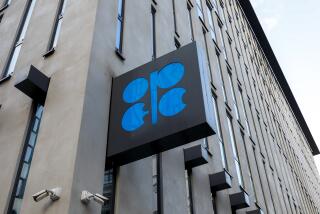OPEC Affirms 2nd Boost in Output
OPEC pledged Thursday to make good on its plan to pump 2% more oil next month, but the cost of crude in New York dipped only slightly as attacks on Iraqi pipelines reignited supply fears.
The price of the U.S. benchmark grade of crude oil fell 20 cents to settle at $40.77 a barrel on the New York Mercantile Exchange. It had jumped $1.50 a barrel the previous day.
“We’re sort of treading water at a fairly high level,” said John Kilduff, a senior vice president at commodities firm Fimat USA Inc. OPEC’s move “had the impact of slowing down the momentum” in the oil markets.
The Organization of the Petroleum Exporting Countries, whose members produce one-third of the world’s oil, said in a statement that “market conditions remain essentially unchanged” since last month, when members agreed to raise the group’s production ceiling in July by 2 million barrels a day and by an extra 500,000 barrels in August, if necessary.
Cartel members had been vacillating on whether to implement the second production hike, which they were set to discuss at a meeting next week in Vienna. The group canceled the meeting Thursday and boosted the official production total to 26 million barrels a day, beginning Aug. 1.
Analysts questioned whether much more oil would find its way to market. Ten of OPEC’s members are already producing above their official limits, and all of them except Saudi Arabia are unable to boost production further, according to analysts. Iraq, the group’s 11th member, is not subject to quotas.
Strong worldwide demand is consuming every bit of oil being produced, and the U.S. has made quick work of a steady flow of imports that has brought 10 million barrels a day of crude to its shores, Kilduff said.
A government report this week showed that oil inventories remained low despite higher imports, largely because gasoline demand continued to soar. Pump prices have fallen only slightly from their record highs as a result, and OPEC’s latest action may offer little relief.
A series of bombings and attacks on oil facilities and workers in Iraq and Saudi Arabia have agitated oil markets for months, leading Kilduff and others to wonder whether OPEC’s output boost would be enough to overcome the “fear premium” that is adding as much as $10 per barrel to the price of oil.
On Thursday, a pipeline attack in northern Iraq halted the flow of 250,000 barrels a day for export through Turkey, with repairs expected to take two days. A separate incident in the south temporarily shut down one of two key export pipelines there.
“The terrorist bombs in Iraq are really playing into these high prices to a large degree,” Kilduff said. “The security fears just seem to be just waiting off stage” whenever prices dip.
More to Read
Inside the business of entertainment
The Wide Shot brings you news, analysis and insights on everything from streaming wars to production — and what it all means for the future.
You may occasionally receive promotional content from the Los Angeles Times.







